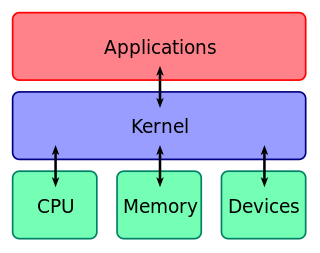The Goodtimes Virus was a computer virus hoax that spread during the early years of the Internet's popularity. Warnings about a computer virus named "Good Times" began being passed around among Internet users in 1994. The Goodtimes virus was supposedly transmitted via an email bearing the subject header "Good Times" or "Goodtimes," hence the virus's name, and the warning recommended deleting any such email unread. The virus described in the warnings did not exist, but the warnings themselves, were, in effect, virus-like. In 1997 the Cult of the Dead Cow hacker collective announced that they had been responsible for the perpetration of the "Good Times" virus hoax as an exercise to "prove the gullibility of self-proclaimed 'experts' on the Internet."
Klez is a computer worm that propagates via e-mail. It first appeared in October 2001. A number of variants of the worm exist.

Antivirus software, or anti-virus software, also known as anti-malware, is a computer program used to prevent, detect, and remove malware.

Norton AntiVirus is an anti-virus or anti-malware software product, developed and distributed by Symantec Corporation since 1991 as part of its Norton family of computer security products. It uses signatures and heuristics to identify viruses. Other features included in it are e-mail spam filtering and phishing protection.
Norton Internet Security, developed by Symantec Corporation, is a computer program that provides malware prevention and removal during a subscription period and uses signatures and heuristics to identify viruses. Other features included in the product are a personal firewall, email spam filtering, and phishing protection. With the release of the 2015 line in summer 2014, Symantec officially retired Norton Internet Security after 14 years as the chief Norton product. It is superseded by Norton Security, a rechristened adaptation of the Norton 360 security suite.

Microsoft Anti-Virus (MSAV) was an antivirus program introduced by Microsoft for its MS-DOS operating system. The program first appeared in MS-DOS version 6.0 (1993) and last appeared in MS-DOS 6.22. The first version of the antivirus program was basic, had no inbuilt update facility and could scan for 1,234 different viruses. Microsoft Anti-Virus for Windows (MWAV), included as part of the package, was a front end that allowed MSAV to run properly on Windows 3.1x.
SULFNBK.EXE is an internal component of the Microsoft Windows operating system for restoring long file names.
Tuxissa is a fictional computer virus hoax made up by Humorix, a humor website on Linux.

Norton Personal Firewall, developed by Symantec, is a discontinued personal firewall with ad blocking, program control and privacy protection capabilities.

Norton SystemWorks is a utility software suite by Symantec Corp. It integrates three of Symantec's most popular products – Norton Utilities, Norton CrashGuard and Norton AntiVirus – into one program designed to simplify solving common PC issues. Backup software was added later to high-end editions. SystemWorks was innovative in that it combined several applications into an all-in-one software for managing computer health, thus saving significant costs and time often spent on using different unrelated programs. SystemWorks, which was introduced in 1998 has since inspired a host of competitors such as iolo System Mechanic, McAfee Nuts And Bolts, Badosoft First Aid and many others.
"Antichrist", or Anticristo, was a Spanish-language computer virus hoax distributed via email in 2001.
A computer virus hoax is a message warning the recipients of a non-existent computer virus threat. The message is usually a chain e-mail that tells the recipients to forward it to everyone they know.
Stration is a family of computer worms that can affect computers running Microsoft Windows, disabling security features and propagating itself to other computers via e-mail attachments. This family of worms is unusual in that new variants are being produced at an unprecedented rate, estimated to be up to one every 30 minutes at its peak, and downloaded from remote servers by infected machines to speed propagation. This makes detection and removal a particular challenge for anti-virus software vendors, because new signature files for each variant need to be issued to allow their software to detect them.

Kernel Patch Protection (KPP), informally known as PatchGuard, is a feature of 64-bit (x64) editions of Microsoft Windows that prevents patching the kernel. It was first introduced in 2005 with the x64 editions of Windows XP and Windows Server 2003 Service Pack 1.
Central Point Software, Inc. was a leading software utilities maker for the PC market, supplying utilities software for the DOS and Microsoft Windows markets. It also made Apple II copy programs. Through a series of mergers, the company was ultimately acquired by Symantec in 1994.
Norton 360, developed by Symantec, is an “all-in-one” security suite for the consumer market.
Norton AntiBot, developed by Symantec, monitors applications for damaging behavior. The application was designed to prevent computers from being hijacked and controlled by hackers. According to Symantec, over 6 million computers have been hijacked, and the majority of users are unaware of their computers being hacked.
Norton PC Checkup was a program downloaded either separately or as a bundle with updates to Adobe Flash, provided to enable users to perform a system checkup of their Microsoft Windows based personal computers. It was launched by Symantec in October 2008.
The jdbgmgr.exe virus hoax involved an e-mail spam in 2002 that advised computer users to delete a file named jdbgmgr.exe because it was a computer virus. jdbgmgr.exe, which had a little teddy bear like icon, was actually a valid Microsoft Windows file, the Debugger Registrar for Java.

Norton, also known as Norton by Symantec, is a division of Symantec, and is based out of Mountain View, California. Since being acquired by the Symantec Corporation in 1990, Norton has offered a variety of products and services related to digital security. In 2014, it was announced that Norton's parent company Symantec would split its business into two units - one focused on security, and one focused on information management, with Norton being placed in the unit focused on security.




